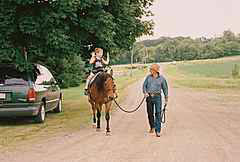Uncommon Horse Sense
Meet Dave
Home ■

The real gift the horse gives us
is not his speed,
his beauty,
his companionship
or his affection;
it is an understanding of ourselves.
Dave Kluge
Experience:
Born and raised on a farm in Wisconsin, Dave has been riding, driving and/or training horses since he was eight. After graduating from the University of Wisconsin-Stout with a bachelors' degree in education, he taught high school in Illinois before moving to Colorado. He began his study of the principles of Natural Horsemanship in 1990 when he attended a clinic conducted by Tom Dorrance. That started him on an intense course of study, attending numerous clinics by such noted clinicians as: Ray Hunt, Buck Brannaman, Pat Parelli, Tom Dorrance, John Lyons, Craig Cameron, Richard Shrake, Linda Tellington-Jones, Curt Pate and Lee Cooper-Smith to name just a few.
Dave has been conducting Natural Horsemanship clinics throughout the country since 1994. During this time he has personally started (not just had in a clinic) well over 400 horses; about one third of which had been rejected by other trainers as "untrainable" or "killers." (Note: not one of these horses ever bucked, the first time it was ridden.) Over the years he has conducted clinics on a variety of subjects including: Horse Starting (not "Breaking"), Trailer Loading, Leadership From The Ground Up, Foundational Riding Skills, Intermediate Riding skills, Basic Ranch Roping, Fundamentals of Team Penning, Preparing the Horse for Driving, Working Cattle Skills and Leadership Training for the Horse Enthusiast.
Philosophy:
If you stop and think about it, we never really ask our horses to do anything for us that they couldn't do on their own. Whether it's a flying change of leads, jumping a log, crossing a creek, herding cows or a doing a piaffe; these are all activities horses do naturally. So the question isn't "How do I make my horse (fill in the blank)?" You don't have to "make" him do anything, he already knows how. The question really is: "How can I cause my idea to become his idea; and communicate it in a way that he understands not just what to do, but how to do it and why it needs to be done?" It's the difference between "teaching" and "training."
"Training" is conditioning the horse to respond to a cue or aid. "Teaching" not only gets him to respond to a request, but do it with an understanding of how, and why. It develops a relationship in which the horse becomes a "willing partner" not just "a reluctant slave." In order to become an effective teacher we must understand the student. We need to know how the horse thinks and sees the world if we are to understand how to teach him.
By approaching the learning process from horse's perspective, many of the problems inherent in more traditional, confrontational training methods can be avoided. Every horse handling problem develops from one of, or a combination of, three elements in the horse/human relationship: Trust, Respect or Communication. Either the horse doesn't trust that he won't get hurt, doesn't care what we are saying, or doesn't understand what is being ask of him.
It is our job as his teacher to determine which of these elements in the relationship is preventing him from performing and adjust our approach to meet his needs. Itís more beneficial for us to understand the principles that allow us to teach the horse, than to memorize a lot of techniques. If we understand the principles we can create the teaching techniques necessary to fit any particular horse, in any given situation.
By understanding the horse's instinctive nature, and the behavior he learns as a herd member, we can approach the education of the horse from a perspective he easily understands. This approach not only dramatically accelerates the learning process; it earns us the horse's Trust, instills in the horse Respect for us as herd leader, and develops a line of Communication the horse can easily understand.
For both partners in the horse/human relationship, Trust gives them the freedom to act, Respect motivates them to act, Communication tells them how to act.